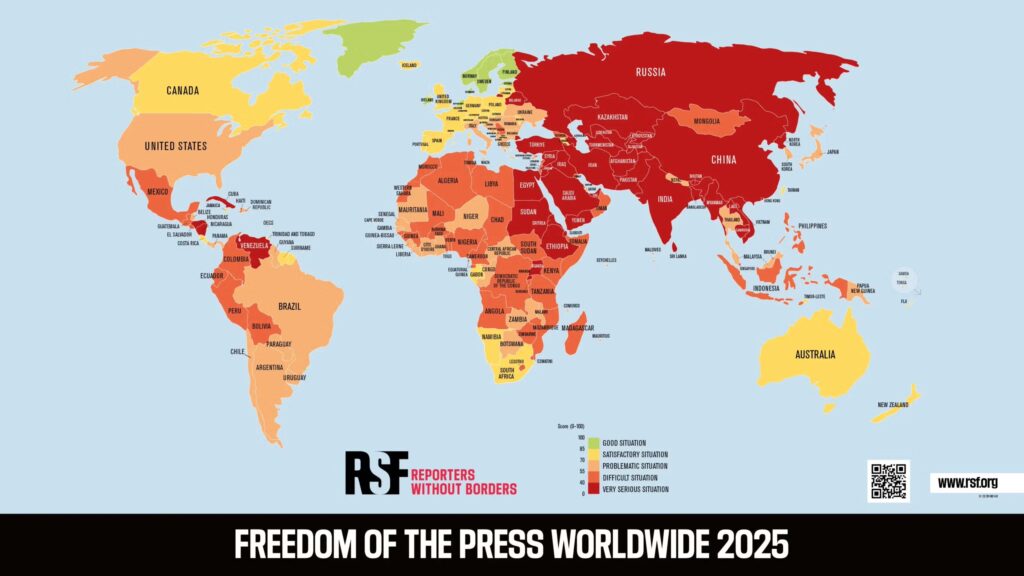- media viability
Economic fragility and political pressure squeeze global media
Each year, the World Press Freedom Index by Reporters Sans Frontières (RSF) provides a snapshot of how free the media is across 180 countries and territories. The 2025 edition paints a stark picture: global press freedom has hit its lowest level since the index began.
The RSF Index evaluates countries across five key indicators: political context, legal framework, economic context, sociocultural context and safety. For media professionals, this year’s results are not just numbers. They reflect the growing challenges on the ground – especially in the Global South but also in Europe, where RNW Media and its partners collaborate to strengthen inclusive, viable and safe media environments. Economic instability, shrinking political space and threats to journalist safety are all converging, making it harder for independent media to survive, let alone thrive.

For the first time, the economic context has become the single biggest threat to press freedom worldwide. In 160 out of 180 countries assessed, media organisations face significant financial challenges. From digital advertising monopolies to the collapse of local news markets, the conditions needed to support independent journalism are eroding fast.
In many parts of the Global South, where public funding is limited and local advertising revenue is low, international support has been critical. That support, too, is now at risk. RSF notes that cuts in donor aid – especially the freezing of nearly $270 million in USAID media funding – have left independent outlets in limbo. These cuts disproportionately affect non-state media, many of which serve as crucial lifelines for communities otherwise excluded from public discourse.
Concern isn’t only limited to USAID cuts. European governments – including in The Netherlands – are scaling back media development funding. These reductions, which are framed as reprioritisations, come at a time when media support is needed most.
In line with the OECD Development Co-operation Principles on Relevant and Effective Support to Media and the Information Environment, RNW Media recently joined GFMD for an urgent call for governments, donors, and stakeholders to take immediate action to address this crisis. We specifically urge stakeholders to increase the volume of funding, especially flexible core funding, and set up emergency budget lines to help independent media to go through this and future crisis.
While economic pressure is rising, it does not stand alone. Political interference continues to shape the media landscape. In many countries across the world, governments are tightening control, using laws, licensing or subtle influence to shape media narratives. As RSF notes, this weakens public trust and narrows the space for independent scrutiny.
The sociocultural context is also a key concern. Journalists, especially women and those reporting on migration, sexuality or minority rights, are facing increasing threats. These range from online abuse to physical danger. Self-censorship is on the rise and the emotional toll is pushing many out of the profession altogether.
The safety of journalists everywhere underpins these challenges. Online threats, harassment and even violence against media professionals continue to rise. Even in countries with relatively strong legal protections, enforcement is often weak. For many journalists, fear is now a regular part of the job.
Despite the grim findings of the 2025 Index, media actors, civil society and donors must double down on collaborative strategies that strengthen resilience – especially in regions where the risks are greatest.
”We support partners who are innovating against the odds, creating new models of engagement and fighting for truthful, ethical media,” says Wouter van Tongeren, CEO of RNW Media.
As RNW Media, we continue to invest in building workable, inclusive media ecosystems that reflect pluralistic views and engage their audiences with rights- and fact-based information with a focus on the following actions to uphold media viability and information integrity
For a detailed analysis of the 2025 RSF Index, visit their website.
We use cookies to enhance your browsing experience and analyze our traffic. By clicking “Accept & Close”, you consent to our use of cookies. Please see Cookie Policy